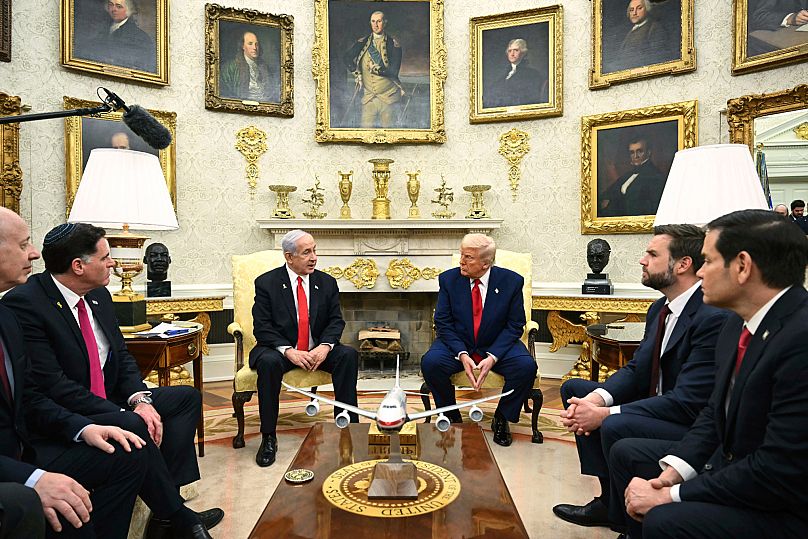US President Donald Trump signed a host of economic and bilateral cooperation agreements in Saudi Arabia on Tuesday at the start of his four-day Middle East tour.
The aim of his trip to the oil-rich kingdom was dealmaking, and Trump has already secured a $142 billion (€127 billion) defence agreement with the country’s de facto ruler, Crown Prince Mohammed bin Salman.
That agreement will see Washington provide Riyadh with “state-of-the-art warfighting equipment” in return for a Saudi investment of $20 billion (€17 billion) in the US’ artificial intelligence sector.
In total, the two leaders signed more than a dozen agreements to increase cooperation between their governments' militaries, justice departments and cultural institutions.

Additional economic agreements are expected to be inked later on Tuesday at a US-Saudi investment conference, which has been put together to coincide with Trump’s visit.
Bin Salman already committed to $600 billion (€537 billion) in new Saudi investment in the US, but Trump teased $1 trillion would be even better.
"I really believe we like each other a lot," Trump said on Tuesday while sitting next to the crown prince at the start of their bilateral meeting.
Next stop: Qatar
The other two countries on Trump's itinerary are Qatar and the United Arab Emirates (UAE). Qatar hit the headlines over the weekend after Trump said he was willing to accept a luxury Boeing 747-8 jumbo jet as a gift from the wealthy state's ruling family.
The US president is expected to announce deals with the three countries that will touch on artificial intelligence, expanding energy cooperation and could include new arms sales to Saudi Arabia.
The Trump administration earlier this month announced initial approval to sell $3.5 billion (€3.1bn) worth of air-to-air missiles for Saudi Arabia's fighter jets.
Trump is trying to show that his transactional strategy for international politics is paying dividends as he faces criticism from Democrats who argue that his global tariff war and approach to Russia's full-scale invasion of Ukraine are isolating the US from its allies.
Saudi Arabia and fellow OPEC+ nations have already helped their cause with Trump during the early stages of his second term by boosting oil production. The US president sees cheap energy as a key way of lowering costs and stemming inflation at home.
Israel exclusion raises eyebrows
The Trump administration's decision to not schedule a trip to Israel during this tour has raised questions about Washington's stance towards its long-time ally.
Several analysts have said the choice may reflect Trump's priorities being focused on economic benefits for the US, rather than broader diplomacy or security issues.
"The main message coming out of this, at least as the itinerary stands today, is that the governments of the Gulf...are in fact stronger friends to Trump than the current government of Israel at this moment," said William Wechsler, a senior director at the Atlantic Council, a US think tank.

Before this trip to the Middle East, Trump announced that Washington was halting a nearly two-month US airstrike campaign against Yemen’s Houthis, saying the Iran-backed rebels have pledged to stop attacking ships along a vital global trade route.
The US did not notify Israel — which the Houthis continue to target — of the agreement before Trump publicly announced it. It was the latest example of Trump leaving the Israelis in the dark about his administration's negotiations with common adversaries.
In March, Israeli Prime Minister Benjamin Netanyahu was not informed by the Trump administration about US talks with Hamas over the war in Gaza until after they had begun.
Netanyahu also only found out about the ongoing US discussions with Iran when Trump announced them during an Oval Office visit by the Israeli leader last month.
US Middle East envoy Steve Witkoff said last week that he envisaged progress soon on expanding the Abraham Accords, a set of deals brokered by Trump in his first term in which Arab states including the UAE, Bahrain, Sudan and Morocco recognised Israel.
However, Trump's ultimate goal of Saudi-Israel normalisation is highly unlikely given that Riyadh has made clear it wants US security guarantees, assistance with the kingdom's nuclear programme and progress on a pathway to Palestinian statehood in exchange.
There appears to be no prospect of making headway on a Palestinian state with the Israel-Hamas war raging and recent Israeli threats to take control of all of Gaza.







